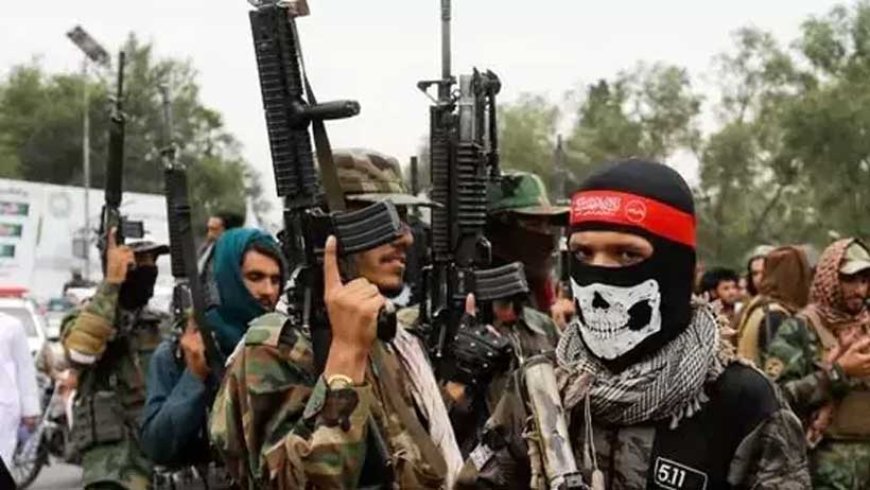Fueling the TTP's Terrorism: Examining India's Role in the Afghanistan-Pakistan Border Conflict
The intensifying tensions between Pakistan and the Afghan Taliban government have assumed an enigmatic complexity marked by historical grievances regional ambitions and global power dynamics. While the ostensible drivers of this discord are rooted in immediate security concerns and competing national interests a deeper analysis reveals the shadow of a far more intricate geopolitical chessboard--one where external actors like the United States and China vie for dominance often at the expense of regional stability.

By: H. Zaïm-Bashi
The intensifying tensions between Pakistan and the Afghan Taliban government have assumed an enigmatic complexity marked by historical grievances regional ambitions and global power dynamics. While the ostensible drivers of this discord are rooted in immediate security concerns and competing national interests a deeper analysis reveals the shadow of a far more intricate geopolitical chessboard--one where external actors like the United States and China vie for dominance often at the expense of regional stability.
A month ago, speculation emerged about China's intention to send a diplomatic entourage to normalize relations between Islamabad and Kabul. A Chinese special envoy cognizant of Pakistan's pivotal geopolitical position sought to mediate between the two fractious neighbors. Beijing's calculation was straightforward: an unstable Pakistan jeopardizes the broader region potentially destabilizing China's flagship Belt and Road Initiative (BRI) and its $50 billion investment in the China-Pakistan Economic Corridor (CPEC).
In an effort to defuse tensions China proposed relocating members of the Tehreek-e-Taliban Pakistan (TTP) from Afghanistan's border regions to more remote locales including Kabul Ghazni and Afghanistan's northern provinces. This plan although ostensibly pragmatic faltered when the Taliban government balked failing to adopt a coherent strategy to address Islamabad's grievances. Instead Kabul maintained a deterrent posture hosting the TTP while dismissing the group's activities as an "internal matter" for Islamabad.
For Pakistan the TTP's presence in Afghanistan is both an existential threat and a national humiliation. The civilian government mired in political turmoil and economic crises acquiesced to China's proposed relocation plan presenting it as a diplomatic achievement. Yet this veneer of success belied internal discord. Pakistan's powerful Inter-Services Intelligence (ISI) agency long the arbiter of the country's Afghanistan policy rejected the relocation strategy as superficial and inadequate.
To the ISI the core issue is not merely the TTP’s presence but its operational freedom on Afghan soil. Islamabad alleges a sinister nexus between New Delhi and Kabul accusing both capitals of using the TTP to destabilize Pakistan. In a stark display of its resolve the Pakistani military recently launched its most extensive airstrikes on Afghan territory targeting areas in Nangarhar and Paktika signaling Pakistan's red lines: curb India's deleterious influence in Afghanistan and dismantle the TTP's operational capabilities.
The Taliban government for its part has leveraged the TTP as a geopolitical tool maintaining strategic ambiguity to deter Pakistani military strikes while pursuing its own regional ambitions. Despite Islamabad's historical role as the Taliban's patron--acting as both lobbyist and benefactor--the Taliban now stands accused of harboring TTP terrorists. This volte-face underscores a shifting dynamic in Afghanistan-Pakistan relations where mutual distrust has eclipsed erstwhile collaboration.
Amid this maelstrom China's role looms large. Beijing’s priority in South Asia is unequivocally geo-economic: the realization of a secure environment for its expansive infrastructure and transit projects. Afghanistan with its untapped mineral wealth and strategic location represents a vital node in China's long-term plans. However; Kabul and New Delhi's support for TTP terrorists threatens to derail Beijing's vision compelling China to push Pakistan toward decisive action.
It is no coincidence that Pakistan's recent military escalation coincided with Chinese mediation efforts. For Beijing the calculus is clear: a secure Afghanistan and a stable Pakistan are indispensable to its regional aspirations. Thus China’s fingerprints are discernible in Pakistan’s renewed military campaign and its hardline stance toward Kabul.
The underlying tensions in South Asia cannot be fully understood without acknowledging the United States’ historical and ongoing role in the region. Decades of U.S. intervention from the arming of anti-Soviet militants during the Cold War to the chaotic withdrawal from Afghanistan in 2021 have left a dark legacy of instability that continues to reverberate. Washington's strategic priorities often defined by short-term gains and imperial hubris have exacerbated regional tensions rather than alleviating them.
While the U.S. has ostensibly pivoted away from South Asia its indirect influence endures complicating efforts by regional powers like China to stabilize the region. By fostering a perpetual state of insecurity Washington has effectively ensured its relevance in South Asian geopolitics even in absentia.
The escalating rift between Pakistan and Afghanistan serves neither nation's interests. Both countries share deep historical cultural and religious ties that could provide a foundation for reconciliation. Yet as history attests military confrontation is a futile means of addressing insecurity. True stability demands a paradigm shift—one that prioritizes dialogue mutual respect and collaborative efforts to combat terrorism.
Kabul and Islamabad must recognize the shared threat posed by external manipulation and extremist violence. By focusing on their ethnic-religious-cultural commonalities: the two nations can chart a path toward a secure and prosperous future free from the meddling of external powers whose interests often run counter to regional stability.
The fraught relationship between Pakistan and Afghanistan exemplifies the perils of regional politics entwined with global power struggles. While China’s mediation offers a glimmer of hope its success depends on Kabul and Islamabad transcending their entrenched antagonisms. Failure to do so risks perpetuating a cycle of violence and instability with devastating consequences for both nations.
In this crucible of conflict; the words of Voltaire ring true: “Les grands ne sont grands que parce que nous sommes à genoux.” (The great are only great because we are on our knees.) For Pakistan and Afghanistan; the path to real independence and security lies in standing united rather than succumbing to the machinations of external powers--notable Washington and New Delhi.













































